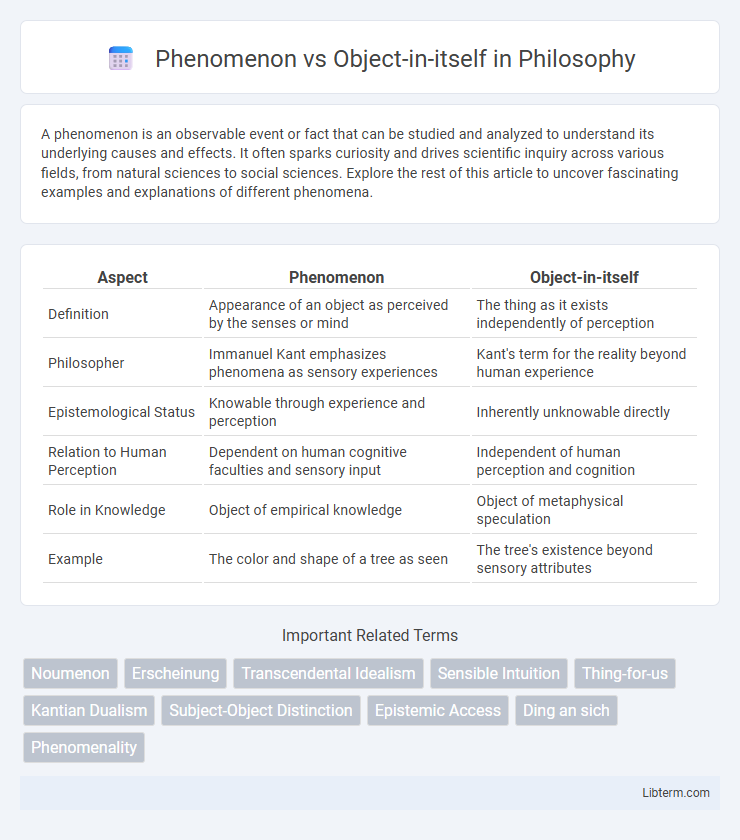A phenomenon is an observable event or fact that can be studied and analyzed to understand its underlying causes and effects. It often sparks curiosity and drives scientific inquiry across various fields, from natural sciences to social sciences. Explore the rest of this article to uncover fascinating examples and explanations of different phenomena.
Table of Comparison
| Aspect | Phenomenon | Object-in-itself |
|---|---|---|
| Definition | Appearance of an object as perceived by the senses or mind | The thing as it exists independently of perception |
| Philosopher | Immanuel Kant emphasizes phenomena as sensory experiences | Kant's term for the reality beyond human experience |
| Epistemological Status | Knowable through experience and perception | Inherently unknowable directly |
| Relation to Human Perception | Dependent on human cognitive faculties and sensory input | Independent of human perception and cognition |
| Role in Knowledge | Object of empirical knowledge | Object of metaphysical speculation |
| Example | The color and shape of a tree as seen | The tree's existence beyond sensory attributes |
Understanding Phenomenon: Definition and Scope
Phenomenon refers to any observable event or experience perceived through the senses, forming the basis of empirical knowledge in phenomenology. Understanding phenomenon involves analyzing how these appearances manifest to consciousness, differing from the object-in-itself, which denotes reality independent of perception and inaccessible directly. The scope of phenomenon encompasses all subjective experiences and the conditions under which they become intelligible, highlighting the essential distinction between lived experience and noumenal reality.
What is Object-in-Itself?
The Object-in-Itself refers to the reality of things as they exist independently of human perception or experience, a concept central to Immanuel Kant's philosophy. It contrasts with phenomena, which are the objects as they appear to human senses filtered through cognitive structures. This distinction emphasizes that the Object-in-Itself remains fundamentally unknowable, as human knowledge is confined to sensory experience and conceptual interpretation.
Philosophical Roots: Kant and Beyond
The distinction between phenomenon and object-in-itself originates from Immanuel Kant's critical philosophy, where phenomena represent appearances shaped by human perception and cognition, while objects-in-themselves (noumena) exist independently and remain inaccessible to direct experience. Kant's framework established a foundational shift by asserting that human knowledge is confined to the phenomenal realm, challenging traditional metaphysics' claims about the noumenal world. Subsequent philosophers, such as Heidegger and Husserl, expanded on Kantian ideas by exploring the implications of this epistemic gap for ontology and phenomenology, emphasizing how phenomena mediate our access to reality.
Phenomenon vs Object-in-Itself: Core Differences
Phenomenon refers to the reality as it appears to human perception and experience, shaped by sensory input and cognitive structures, whereas the Object-in-itself represents the reality independent of observation, inaccessible directly to human knowledge. The core difference lies in the epistemological boundary: phenomena are mediated through consciousness and thus subject to interpretation, while the object-in-itself exists beyond the limits of empirical investigation. Kantian philosophy emphasizes this distinction, asserting that while phenomena can be studied scientifically, the object-in-itself remains a noumenal entity, inherently unknowable.
Perception and Reality: Bridging the Gap
Phenomenon refers to the way objects appear through sensory experience, while the Object-in-itself represents the true essence beyond perception. Bridging the gap between perception and reality involves examining how subjective consciousness interprets external stimuli, shaping our understanding of existence. This interplay highlights the limitations of human cognition in accessing the noumenal world directly, emphasizing reliance on phenomena as mediators of reality.
The Role of Consciousness in Phenomenology
Consciousness plays a pivotal role in phenomenology by mediating the relationship between phenomenon and the object-in-itself, emphasizing how objects are experienced rather than their independent existence. Phenomenology asserts that all phenomena are essentially tied to conscious perception, making the subjective experience fundamental to understanding reality. This approach contrasts with metaphysical views that treat the object-in-itself as inaccessible and independent from human cognition.
Objectivity and Subjectivity: A Comparative Analysis
Phenomenon refers to the subjective experience or appearance of an object as perceived by consciousness, whereas the Object-in-itself denotes the objective reality existing independently of perception. Objectivity lies in the unchanging essence of the Object-in-itself, which remains inaccessible and unknowable directly, while subjectivity characterizes the phenomenon shaped by sensory experience and cognitive interpretation. This comparative analysis underscores the philosophical distinction between reality as it exists independently and reality as it manifests to human understanding.
Modern Implications in Science and Technology
The distinction between phenomenon and object-in-itself shapes contemporary scientific inquiry by emphasizing observable data over metaphysical assumptions, driving empirical methodologies in physics and cognitive sciences. Advances in quantum mechanics and artificial intelligence reflect this paradigm, where measurable interactions take precedence over elusive intrinsic realities. Technologies such as machine learning and instrumentation design rely heavily on phenomena, optimizing data interpretation without presuming the unknowable essence of objects beyond observation.
Common Misconceptions and Clarifications
Phenomenon refers to things as they appear to human perception, while object-in-itself denotes the reality independent of observers. A common misconception is equating phenomenon with the full essence of an object, ignoring Kant's distinction that phenomena are shaped by sensory and cognitive frameworks. Clarifying this distinction is crucial for understanding epistemology and the limits of human knowledge in philosophy.
Significance in Contemporary Philosophy
The distinction between Phenomenon and Object-in-itself remains pivotal in contemporary philosophy, highlighting the limits of human perception and cognition. Phenomena represent objects as they appear to consciousness, while the Object-in-itself exists independently of observation, emphasizing the gap between experience and reality. This theoretical framework challenges epistemological assumptions and fuels debates in ontology, phenomenology, and critical theory today.
Phenomenon Infographic

 libterm.com
libterm.com